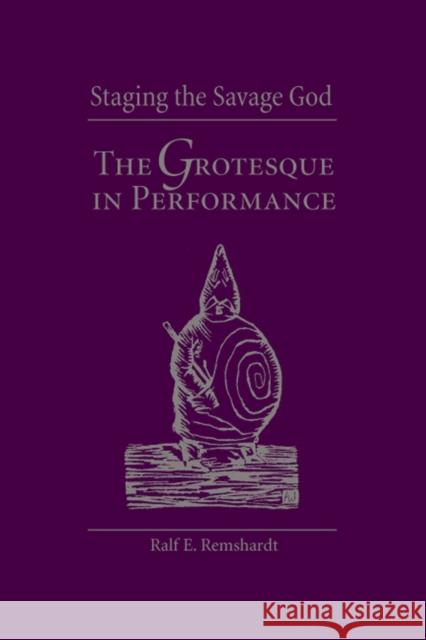Staging the Savage God: The Grotesque in Performance » książka
Staging the Savage God: The Grotesque in Performance
ISBN-13: 9780809325764 / Angielski / Twarda / 2004 / 304 str.
Staging the Savage God: The Grotesque in Performance
ISBN-13: 9780809325764 / Angielski / Twarda / 2004 / 304 str.
(netto: 135,22 VAT: 5%)
Najniższa cena z 30 dni: 139,97
ok. 30 dni roboczych.
Darmowa dostawa!
In this broadly conceived study, Ralf E. Remshardt delineates the theatre's deep connection with the grotesque and traces the historically extensive and theoretically intensive relationship between performance and its "other," the grotesque. Staging the Savage God: The Grotesque in Performance examines the aesthetic complicity shared by the two in both art and theatre and presents a general theory of the grotesque. Performing the grotesque is both a challenge to a culture's order and the affirmation of certain ethical principles that it recognizes as its own. Remshardt investigates the aesthetics and ideology of grotesque theatre from antiquity--in works such as The Bacchae and Thyestes--to modernity--in Ubu Roi and Hamletmachine-- and opens up new critical possibilities for the analysis of both classical and avant-garde theatre. Divided into three sections, Staging the Savage God first interrogates the grotesque as primarily a visual artistic and theatrical mode and then inventories various critical approaches to the grotesque, establishing the outlines of a theory with regard to drama. In the most extensive part of the study, Remshardt shifts his emphasis to the theatre of the grotesque, from self-consuming tragedies and the modernist trope of the artificial human figure to the characterology of the grotesque. Remshardt's conclusion takes bold steps towards unraveling the paradox inherent in the grotesque theatre. Written in an engaging and frequently polemical style and aided by nine illustrations, Staging the Savage God is a comprehensive and rigorous study that incorporates critical approaches from disciplines such as philosophy, psychoanalysis, art history, literature, and theatre to fully investigate the historical function of the grotesque in performance.











